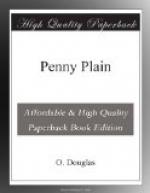They were in the Hopetoun Woods now, and at the end of the avenue could see the house standing on a knoll by the river, whitewashed, dignified, home-like.
“Talk to Mrs. Hope about the view,” Jean advised “She is as proud of the Hopetoun Woods as if she had made them. Isn’t it a nice place? Old and proud and honourable—like Mrs. Hope herself.”
“Are there sons to inherit?”
Jean shook her head. “There were three sons. Mrs. Hope hardly ever talks about them, but I’ve seen their photographs, and of course I have often been told about them—by Great-aunt Alison, and others—and heard how they died. They were very clever and good-looking and well-liked—the kind of sons mothers are very proud of, and they all died imperially, if that is an expression to use. Two died in India, one—a soldier—in one of the Frontier skirmishes: the other—an I.C.S. man—from over-working in a famine-stricken district. The youngest fell in the Boer War ... so you see Mrs. Hope has the right to be proud. Aunt Alison used to tell me that she made no moan over her wonderful sons. She shut herself up for a short time, and then faced the world again, her kindly, sharp-tongued self. She is one of those splendid people who take the slings and arrows thrown at them by outrageous fortune and bury them deep in their hearts and go on, still able to laugh, still able to take an interest. Only, you mustn’t speak to her of what she has lost. That would be too much.”
“Yes,” said Pamela. “I can understand that.”
She stopped for a minute and stood looking at the river full of “wan water from the Border hills,” at the stretches of lawn ornamented here and there by stone figures, at the trees thrawn with winter and rough weather, and she thought of the three boys who had played here, who had lived in the whitewashed house (she could see the barred nursery windows), bathed and fished in the Tweed, thrown stones at the grey stone figures on the lawn, climbed the trees in the Hopetoun Woods, and who had gone out with their happy young lives to lay them down in a far country.
Mrs. Hope was sitting by the fire in the drawing-room, a room full of flowers and books, and lit by four long windows. Two of the windows looked on to the lawns, and the stone figures chipped by generations of catapult-owning boys; the other two looked across the river into the Hopetoun Woods. The curtains were not drawn though the lamps were lit, for Mrs. Hope liked to keep the river and the woods with her as long as light lasted, so the warm bright room looked warmer and brighter in contrast with the cold, ruffled water and the wind-shaken trees outside.
Mrs. Hope had been a beautiful woman in her day, and was still an attractive figure, her white hair dressed high and crowned with a square of lace tied in quaint fashion under her chin. Her black dress was soft and becoming to her spare figure. There was nothing unsightly about her years; she made age seem a lovely, desirable thing. Not that her years were so very many, but she had lived every minute of them; also she had given lavishly and unsparingly of her store of sympathy and energy to others: and she had suffered grievously.




